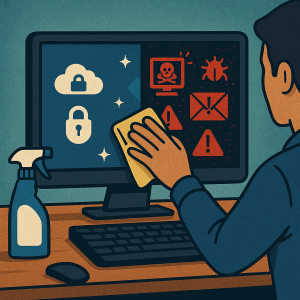
When it comes to protecting your business from cyberthreats, the basics of cyber hygiene for small business matter more than ever. IBM’s 2023 Cost of a Data Breach Report revealed that 82% of breaches involved cloud-stored data, and many could have been prevented with simple safeguards.
Think of cyber hygiene as your company’s version of daily handwashing. You wouldn’t skip washing your hands before preparing food, right? The same principle applies to business technology: if you neglect the basics, you’re exposing your systems, your clients, and your reputation to unnecessary risks.
For small businesses, the stakes are especially high. Limited IT budgets, smaller teams, and fewer dedicated security staff make SMBs an attractive target for hackers. In fact, small businesses are now the target of nearly half of all cyberattacks. That means adopting good cyber hygiene isn’t just smart—it’s essential for survival.
Here are six key pillars of cyber hygiene that every small business must lock down.
1. Secure Your Network Like Your Business Depends on It (Because It Does)
Your network is the digital highway your business runs on. If it’s compromised, attackers can move quickly to steal data, disrupt operations, or install ransomware.
Here are the foundational steps:
-
Encrypt your data so that even if hackers intercept it, it’s unreadable.
-
Enable a firewall to create a protective barrier between your internal systems and outside threats.
-
Lock down your Wi-Fi by hiding the SSID, using WPA3 encryption, and requiring strong, unique passwords.
-
Deploy a business-grade VPN for remote workers. This is especially critical with today’s hybrid workforces.
Skipping these measures is like leaving your office doors unlocked overnight—you might not notice the risk immediately, but eventually, someone will take advantage.
2. Train Your People—They’re Your First Line of Defense
Even the most advanced cybersecurity tools won’t help if your employees don’t know how to use them safely. Human error remains the number-one cause of breaches, but training can drastically reduce the risk.
What to include in your training program:
-
Password hygiene: teach employees how to create and manage strong, unique passwords. Encourage password managers where possible.
-
Multi-factor authentication (MFA): show why MFA is essential, and make sure everyone understands how to use it.
-
Phishing awareness: simulate phishing emails regularly so staff learn to spot suspicious links and attachments.
-
Data handling policies: clear rules for sharing, storing, and transferring sensitive information.
The best approach? Bite-sized, ongoing training sessions instead of one-off “check the box” seminars. This keeps security top-of-mind and helps employees apply good practices in their daily work.
3. Back Up Data—And Actually Test Your Restores
Data is the lifeblood of modern business. If you lose access to it, your business can grind to a halt overnight. Backups are your safety net, but only if they’re done right.
-
Automate backups so you don’t rely on someone remembering to do it manually.
-
Back up frequently, especially critical data like HR records, financial information, and customer databases.
-
Use the 3-2-1 rule: three copies of your data, on two types of media, with one copy stored offsite or in the cloud.
-
Test your restores at least quarterly to ensure backups are usable when you actually need them.
Many businesses discover too late that their backup files were corrupted, incomplete, or inaccessible. Testing is what separates a reliable backup plan from a false sense of security.
4. Limit Access with the Principle of Least Privilege
Not every employee needs access to all company data. In fact, the fewer people who have access, the safer you’ll be. This is where the principle of least privilege comes in.
-
Employees should only have access to the data and systems required for their role.
-
Administrative privileges should be restricted to trusted IT staff and select leadership.
-
Offboarding should include immediate removal of all system access for departing employees.
By limiting access, even if one account is compromised, the damage is contained. Think of it as installing fire doors in your building—it prevents one spark from burning everything down.
5. Keep Systems and Software Updated
Outdated systems are low-hanging fruit for cybercriminals. Hackers actively scan for businesses running unpatched software, because those vulnerabilities are basically open invitations.
-
Enable automatic updates on operating systems, browsers, and applications.
-
Regularly patch servers, routers, and firewalls.
-
Replace end-of-life systems (like Windows 10 after October 2025) before they stop receiving security updates.
Yes, updates can feel inconvenient. But a short reboot is nothing compared to the weeks—or months—of recovery after a breach.
6. Monitor and Respond Proactively
Good cyber hygiene doesn’t end with prevention—you also need detection and response. Small businesses should implement monitoring tools that provide alerts for unusual activity.
-
Use an endpoint detection and response (EDR) solution to spot threats in real-time.
-
Configure centralized logging so you can track who accessed what and when.
-
Partner with an MSP or SOC provider if you don’t have the resources for in-house 24/7 monitoring.
Quick detection can mean the difference between shutting down an attack in its early stages or becoming tomorrow’s headline.
Why Cyber Hygiene for Small Business Is Worth the Effort
Taking these steps might seem like extra work, but the payoff is huge. According to the National Cybersecurity Alliance, 60% of small businesses close within six months of a cyberattack. Strong cyber hygiene is an investment in your business’s resilience and future growth.
It also helps you:
-
Maintain customer trust. Clients expect their data to be protected.
-
Stay compliant. Industries like healthcare, finance, and retail have strict regulations. Poor hygiene risks fines and legal consequences.
-
Reduce downtime. Preventing attacks keeps your operations running smoothly.
-
Save money. Proactive measures are far cheaper than breach recovery.
Take Action Now
If you’re serious about improving cyber hygiene for small business, don’t wait until after a breach to take action. A security assessment is the best place to start.
At Iler Networking & Computing, we help small businesses—from dental practices to accounting firms—strengthen defenses, train teams, and ensure compliance with HIPAA, PCI, and IRS Safeguards.
Schedule your free IT assessment today and find out where your business stands.
For additional insights, the U.S. Cybersecurity and Infrastructure Security Agency (CISA) offers an excellent Small Business Cybersecurity Corner with tips and resources to help owners improve their security posture.
Cyber threats aren’t slowing down, and small businesses remain prime targets. The good news is that foundational cyber hygiene practices—like securing your network, training your team, backing up data, and limiting access—are cost-effective, straightforward, and incredibly powerful.
By making cyber hygiene part of your daily business routine, you’re not just protecting data—you’re protecting your reputation, your clients, and your future.







